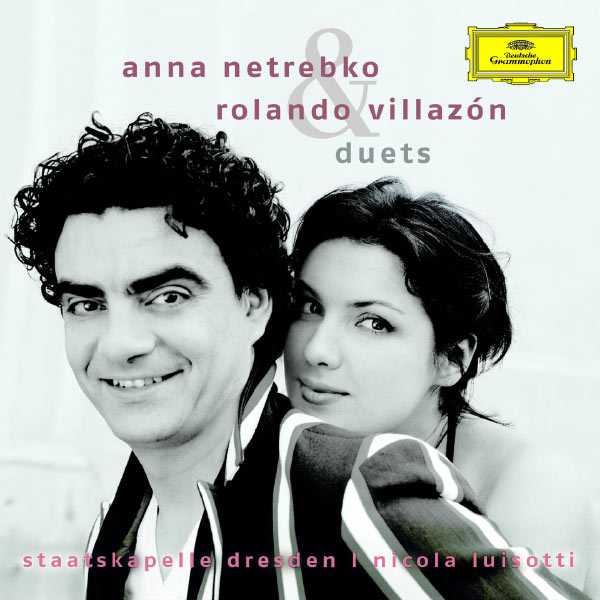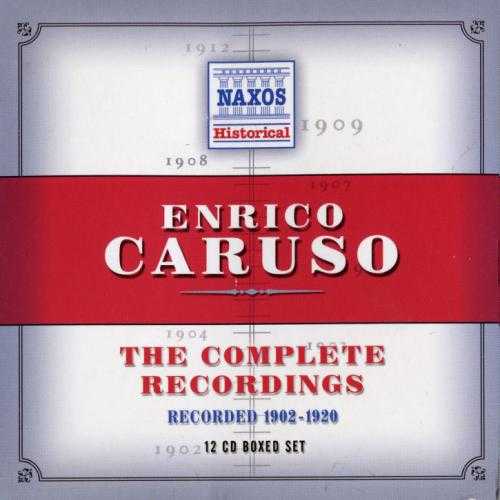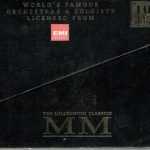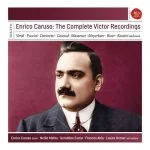
Composer: Georges Bizet, Gaetano Donizetti, Charles François Gounod, Jules Emile Frederic Massenet, Giacomo Puccini, Pyotr Il’yich Tchaikovsky, Federico Moreno Torroba, Giuseppe Verdi
Performer: Anna Netrebko, Rolando Villazón
Orchestra: Staatskapelle Dresden
Conductor: Nicola Luisotti
Format: FLAC (tracks)
Label: Deutsche Grammophon
Catalogue: 4776457
Release: 2007
Size: 298 MB
Recovery: +3%
Scan: cover
Puccini: La Bohème: Act 1
01. “O soave fanciulla”
Donizetti: Lucia di Lammermoor / Act 1
02. Lucia perdona…Sulla tomba
Verdi: Rigoletto / Act 1
03. “Giovanna, ho dei rimorsi…E il sol dell’anima”
Gounod: Roméo et Juliette / Act 4
04. Va! je t’ai pardonné … Nuit d’hyménée
Bizet: Les pêcheurs de perles / Act 2
05. No.8 Chanson: “De mon amie, fleur endormie” – No.9 Duo “Léila! Léila! Dieu puissant”
Massenet: Manon / Act 3
06. Toi! Vous!… Ah! Viens, Manon, je t’aime!
Tchaikovsky: Iolanta
07. “Tvajo malchan’je nepan’atna”
Torroba: Luisa Fernanda / Act 3
08. Cállate, corazón! Duèrmete y calla!
Soprano Anna Netrebko and tenor Rolando Villazón are paired here in “opera’s greatest love duets,” music that allows their ample and expressive voices to soar. Villazón has been compared to Domingo for the quality of his tone, his vocal discipline, and the expressiveness of his interpretations, and these elements are all in evidence here. In “È il sol dell’anima,” from Rigoletto, the intensity of his characterization is especially penetrating. The purity of Netrebko’s tone and the youthful innocence she expresses so persuasively are hugely touching; in her final lines of the first scene of La bohème, before Mimì and Rodolfo leave the stage, she sounds so blissfully and simply happy that the awareness of the couple’s fate makes the moment unbearably poignant. One intriguing element of the album is having each singer join in a duet from the repertoire that’s the other singer’s specialty, so there is a selection from Tchaikovsky’s Iolanta in Russian, and from Torroba’s 1932 zarzuela Luisa Fernanda in Spanish. Netrebko and Villazón are well matched in their vocal weight and in the depth of their investment in their roles, and the equality of their partnership makes the album especially satisfying. The collection should be of strong interest to Netrebko’s and Villazón’s fans, and to opera lovers who enjoy old-fashioned, larger-than-life moments of high passion. Nicola Luisotti (who also sings the brief lines of Ceprano and Borsa in the Rigoletto excerpt) leads the orchestra of Staatskapelle Dresden in lively and polished performances. Deutsche Grammophon’s sound is clean, with fine balance between the singers and orchestra.



